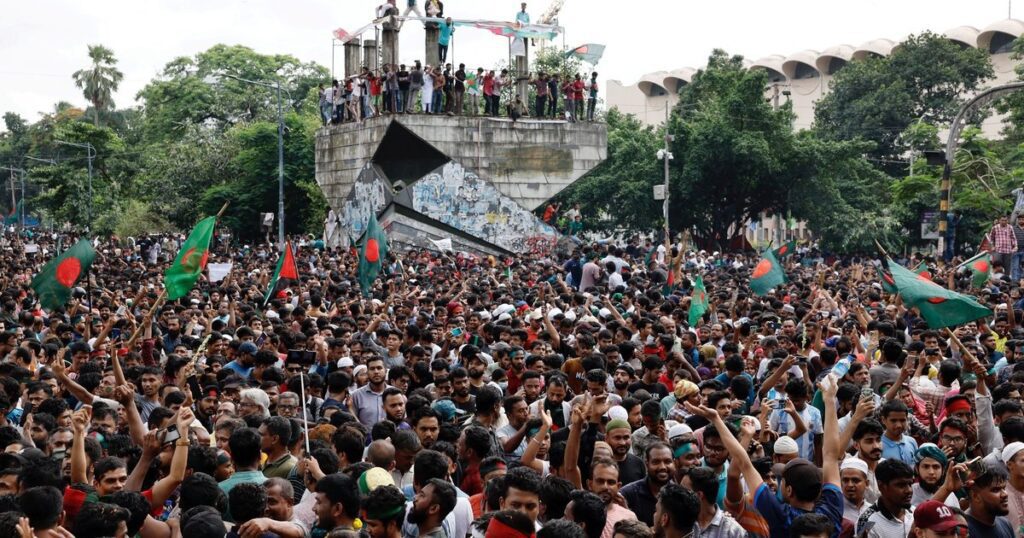After an escalating round of protests in Bangladesh in recent months, longtime leader Sheikh Hasina, who had fought back many prior demonstrations, has resigned and left Bangladesh, according to the army chief. Although many Bangladeshis have been angry at Hasina’s heavy-handed rule for years, this fury came to a head this summer. After Sheikh Hasina and her long-ruling, increasingly authoritarian Awami League seemingly crushed a first round of protests related to set asides for relatives of independence war veterans several weeks ago in Bangladesh, through massive arrests, torture, and murders, there was a degree of forced calm in the streets of Dhaka and other parts of the country. In addition, the government thought it had potentially addressed part of the root causes of the protests, as the top court reduced in July the number of jobs allocated to relatives of people who fought in the Bangladesh war of independence, a system that had turned into a major source of political patronage for Hasina and her party.
But Hasina and the government were wrong. Revulsion at the initial brutal crackdown—the thousands of arrests, the obvious torture, the extrajudicial killings, the security forces storming into hospitals to grab people or harm them— combined with years of frustration at Hasina’s aloof, brutal, and ineffective rule led to a larger, increasingly high-stakes round of protests this past weekend. Huge crowds gathered in Dhaka and other parts of the country, and this time the demands were not just for changes to the laws about set-asides for families of veterans or other more specific issues, but broad protests against the regime and Hasina herself, who had once been known as a democrat but in recent years had devolved into one of the most repressive leaders in South Asia, and Bangladesh had become a dangerous environment for journalists, writers, artists, university students and professors, opposition politicians, and anyone else who questioned Hasina and her party.
More on:
This time around, this past weekend, the growing and increasingly angry protests, focused on the rising authoritarianism, weak economy given Bangladesh’s potential, and specifically on dumping Hasina, could only be solved by Hasina stepping down, or by her and her regime moving into an even higher level of violence. Such a higher order of violence would have led the military and security forces into massive bloodshed of their own people and possible destruction of the capital, parts of which are already burning.
It appears that the security forces were not willing to go along with even broader murder, as so many people rallied in the capital and other parts of the country. Protestors marched in large numbers toward Hasina’s residence, and the army, which always has played a sizable role in Bangladesh politics but has not wanted to place itself in the middle of this crackdown, was forced to choose how to respond, even if, for several pained hours, Hasina, who surrounds herself with a tiny group of advisors, seemed unwilling to leave or unable to understand she had to leave to cool the situation.
Finally, later in the afternoon Monday (Bangladesh time), after fifteen years in power, and as demonstrators had made it into her palace, Hasina resigned and fled to India in exile, causing massive festivities in the streets of Dhaka and other parts of the country. The army took over in the interim. The country’s army chief General Waker-Uz-Zaman addressed the nation on television and said that a transitional government would soon follow. He did not provide specifics on how the army would form this interim government, but promised the country that justice would be pursued for those killed during protests. Zaman also, according to the Guardian, announced that there would be an investigation into the deaths during the crackdowns. He also put in place a curfew for the rest of Monday, though people were still cheering on the streets.
A curfew was put in place on Monday and offices and factories were closed but protesters have still taken to the streets. Bangladeshi TV channels showed jubilant demonstrators dancing and chanting at locations across Dhaka, though there also has been looting and some burning of cars and other similar types of violence.
As reports emerge that Hasina has landed near Delhi, she leaves behind a country with so much promise and which she has hampered in so many ways, from throttling what was once a vibrant political culture and civil society to undermining an economically vital garment sector and also hurting the possibility of boosting the economy by attracting more multinational investment in other sectors. She herself destroyed her own political capital in the years in which she squandered her democratic legitimacy. The country is torn against itself, Islamists have more power today, and Bangladesh’s political culture is even more violent and dangerous than it was twenty years ago. (Hasina claims that this is it—she will not mount a political comeback.)
More on:
What’s more, while the military has promised an interim government and then an election, it has a long history of interfering in politics, and there is no certain guarantee they will leave this time; there is also an increasing trend in South and Southeast Asia in recent years of growing military meddling in politics. In addition, increasingly powerful and growing Islamist groups also will be a force to reckon with in a future Bangladesh, and they are plenty dangerous as well. With Hasina gone, her legacy will take some time to be overcome, if it can be overcome at all, and she leaves the country’s politics and economy in a perilous state.

